BBC News, Harare
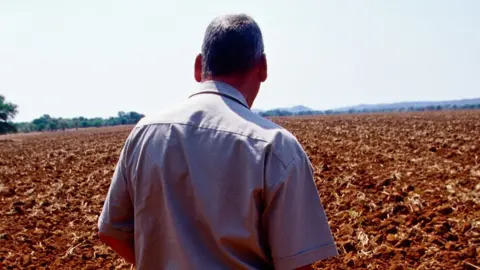 Getty Images
Getty ImagesA quarter of a century after their land was seized during a chaotic land reform programme that made global headlines, a small group of white Zimbabwean farmers have accepted a controversial compensation deal from the government.
Once the backbone of the country’s agricultural sector, many of them are now elderly, visibly frail, battling illness and financially desperate.
«I believe this is the only opportunity. We can’t wait 10 years for another deal, » 71-year-old Arthur Baisley told the BBC.
Still recuperating from back surgery, Mr Baisley was among those who arrived earlier this year at a conference room in the capital, Harare – some aided by walking sticks and walking frames – to discuss the deal.
The catch is that these farmers have now been paid only 1% of their total compensation in cash – the rest is being issued as US dollar-denominated treasury bonds that mature in 10 years – with 2% interest paid twice a year.
The land reform programme, sparked by the invasion of white-owned farms around the country by supporters of the late Robert Mugabe, was launched in 2000 by the then president, who was desperate to shore up political support at the time when Zimbabwe had about 2,500 white farmers owning 4,000 farms – half of the country’s best farmland.
The seizures became Africa’s biggest modern-day land revolution, and was meant to redress colonial-era land grabs, when black people were forced to leave their land. But it set the country on a collision path with Western nations – economic sanctions followed, companies exited and the economy collapsed.
This compensation deal has been pushed by Mugabe’s successor President Emmerson Mnangagwa, who is keen to mend fences. The money being given to the farmers, as stipulated by the constitution, is for infrastructure and improvements to the land – like buildings and dams, not the value of the land itself, which Zimbabwe’s government insists was illegally seized from the country’s original inhabitants.
Overall this is estimated to total $3.5bn (£2.6bn). However, the recent cash pay-out totalled just $3.1m for 378 farms.
Mr Baisley said it was not the best deal but was reasonably fair – and his decision to accept it has come with the realisation that the takeovers cannot be undone.
«It was difficult for my family in the beginning but life goes on, you have to move on,» he said, adding that he would start selling some of the bonds immediately to offset medical bills and to care for his sickly parents.
It is a significant shift, a softening of hard lines previously drawn by both sides.
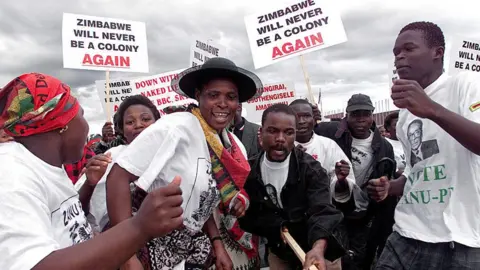 AFP/Getty Images
AFP/Getty ImagesMugabe used to pound the lectern at party rallies saying the white farmers should go to the UK, the former colonial power, for their compensation – although quietly he was paying out select farmers.
The white farmers meanwhile had insisted on a $10bn full cash settlement. Both sides have settled on the $3.5bn figure.
However, unlike Mr Baisley, the majority of white farmers are holding out for a deal which would see all the cash paid upfront.
Deon Theron, who in 2008 was forced off the farm he had bought after independence, leads more than 1,000 farmers who have rejected the offer.
Boxes of his possessions, hastily packed during his departure, still fill the veranda of his Harare home where he told me the deal was not fair as there was no guarantee that the bonds would be honoured in 10 years’ time.
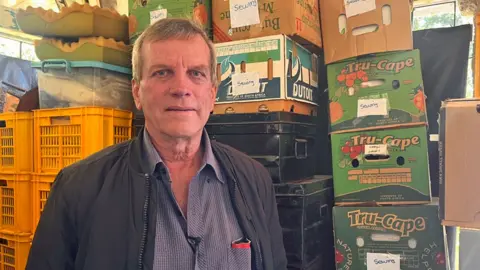
The 71-year-old said it was clear that the government did not have the money – and he wanted to see the international community, including the UK, help with negotiations as the government was refusing to budge, or even meet the dissenting group.
«The British can’t go and sit in the pavilion and watch what’s happening because they are part of it. They are linked with our history. They can’t walk away from it,» he told the BBC.
In an agreement brokered in the run-up to independence, the UK was to support land reform financially – but it floundered towards the end of the 1990s when the Labour government came to power and relations soured.
The need to re-engage Britain on the compensation was the battle cry of many of the war veterans who led the farm invasions. They had fought in the 1970s war against white-minority rule – and felt let down by the slow pace of land reform following independence.
But like the white farmers, the war veterans are also split over the government’s handling of the compensation.
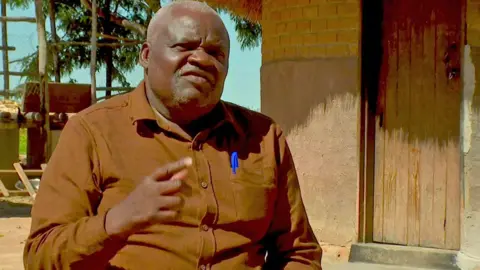
One faction is suing the government for «clandestinely» agreeing to pay $3.5bn in compensation, saying the offer should have been agreed in parliament.
One of its leaders, Godfrey Gurira, said that given the myriad economic challenges cash-strapped Zimbabwe faced, it should not have prioritised white farmers.
«It’s such a colossal amount… for a nation of our size. People are suffering they can hardly make ends meet, the hospitals have nothing, then we have the luxury to pay $3.5bn. In our opinion it’s an unnecessary act of appeasement,» he told the BBC.
A second lawsuit challenges an aspect of a new land policy that demands that new farmers pay for the land in order to obtain title deeds to own the land outright.
In the wake of the redistribution, the 250,000 people who replaced the 2,500 white farmers were only entitled to 99-year leases. However this meant it was near-impossible for them to get bank loans as their security of tenure was not guaranteed.
Last year, the government said farmers could apply to own their land outright – with title deeds – but they needed to pay between $100 and $500 per hectare (2.47 acres).
That money will go towards the compensation deal to white farmers, according to the government.
Those challenging this say forcing black farmers to effectively buy back the land contradicts the law.
And the black farmers themselves are divided over the issue.
The land reform programme has had mixed results. Many new farmers did not have the skills, the finances and labour to farm successfully. But the country’s agricultural sector is now rebounding with pockets of successful farmers.
In 2002, Solomon Ganye arrived on a bicycle to receive a 20-hectare bare piece of land in Harare South.
It was part of the sprawling 2,700-hectare farm that had been divided among 77 people.
He found the initial years a struggle – suffering from a lack of finances and climate shocks. But slowly through Chinese money ploughed into the tobacco sector, and after handing the business over to his sons – both agriculture graduates in their 20s – things have improved.
They have built an enviable enterprise with 200 permanent workers, and have expanded into dairy and livestock farming. They are applying for the title deeds of their land and have even acquired more in recent years from the government.
Aaron Ganye, his oldest son, told the BBC that without the land reform programme, his family would probably not have been able to buy a farm because in the past the structure of ownership saw vast tracts of land being held by a single family.
«I’m very happy because to be honest we’ve taken farming to another level because now we’re living a good life through farming. We’re doing more than what the white guys were doing in terms of quality of tobacco and the leaf is good,» the 25-year-old said proudly.
«We’ve invested in technology. It’s not easy. I’m now motivating more farmers to do good work here,» he said.
He does believe that new farmers should contribute to compensation payments but based on the value of infrastructure they inherited.
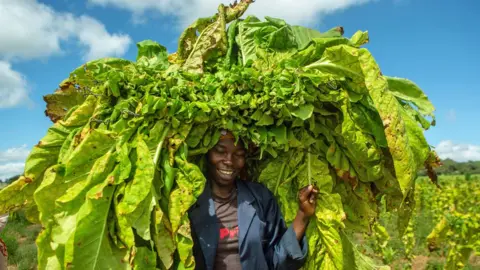 Getty Images
Getty ImagesOn the political front, tensions are also easing – and the UK government no longer has any Zimbabwean on its sanction list having recently delisted four military and government officials it had accused of human rights abuses.
The UK’s Foreign, Commonwealth and Development Office told the BBC this was because they were no longer in the positions they held at the time they were added to the list in 2021.
Nonetheless, it is a significant development, marking the end of more than 20 years of sanctions against Zimbabwe.
The country now hopes that the farmers’ compensation issue can be properly sorted out to get Western support for ongoing talks on restructuring its massive foreign debt.
There is no question that 25 years on, calm has returned to almost all farming fronts.
Agriculture is rebounding, this year farmers have sold over 300,000 tonnes of tobacco at auction – the highest tobacco production ever.
But compromise is needed on all sides for the country to fully jump over the hurdle of land reform and its fallout.
More Zimbabwe stories from the BBC:
 Getty Images/BBC
Getty Images/BBC




